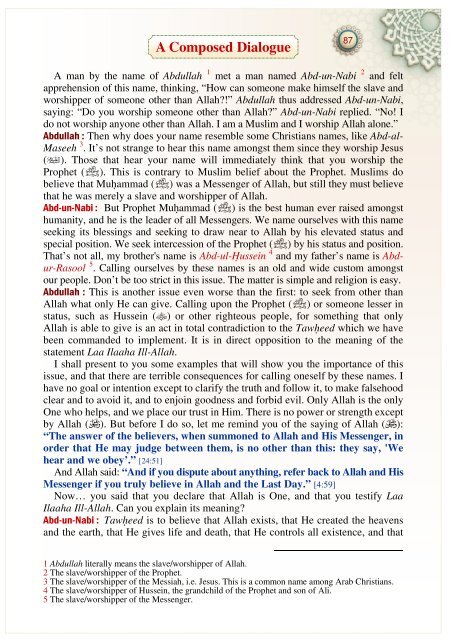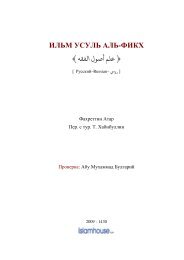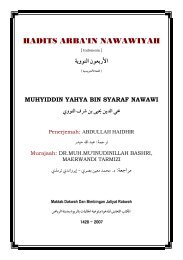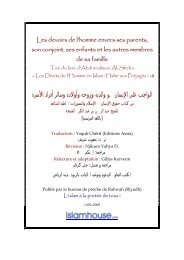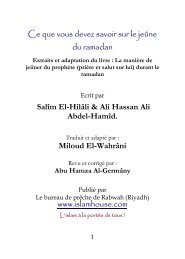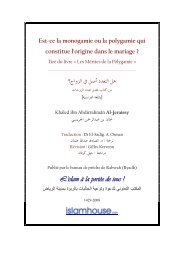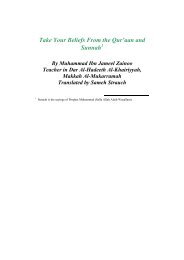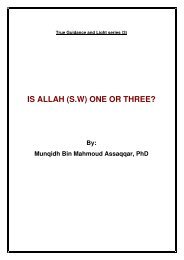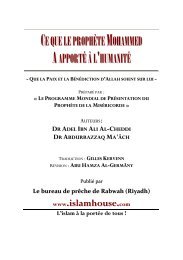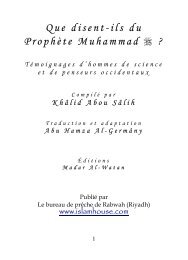are there? - Islam Center
are there? - Islam Center
are there? - Islam Center
Create successful ePaper yourself
Turn your PDF publications into a flip-book with our unique Google optimized e-Paper software.
A Composed Dialogue<br />
87<br />
A man by the name of Abdullah 1 met a man named Abd-un-Nabi 2 and felt<br />
apprehension of this name, thinking, “How can someone make himself the slave and<br />
worshipper of someone other than Allah?!” Abdullah thus addressed Abd-un-Nabi,<br />
saying: “Do you worship someone other than Allah?” Abd-un-Nabi replied. “No! I<br />
do not worship anyone other than Allah. I am a Muslim and I worship Allah alone.”<br />
Then why does your name resemble some Christians names, like Abd-al-<br />
Maseeh 3 . It’s not strange to hear this name amongst them since they worship Jesus<br />
(). Those that hear your name will immediately think that you worship the<br />
Prophet (). This is contrary to Muslim belief about the Prophet. Muslims do<br />
believe that Muhammad () was a Messenger of Allah, but still they must believe<br />
that he was merely a slave and worshipper of Allah.<br />
But Prophet Muhammad () is the best human ever raised amongst<br />
humanity, and he is the leader of all Messengers. We name ourselves with this name<br />
seeking its blessings and seeking to draw near to Allah by his elevated status and<br />
special position. We seek intercession of the Prophet () by his status and position.<br />
That’s not all, my brother's name is Abd-ul-Hussein 4 and my father’s name is Abdur-Rasool<br />
5 . Calling ourselves by these names is an old and wide custom amongst<br />
our people. Don’t be too strict in this issue. The matter is simple and religion is easy.<br />
This is another issue even worse than the first: to seek from other than<br />
Allah what only He can give. Calling upon the Prophet () or someone lesser in<br />
status, such as Hussein () or other righteous people, for something that only<br />
Allah is able to give is an act in total contradiction to the Tawheed which we have<br />
been commanded to implement. It is in direct opposition to the meaning of the<br />
statement Laa Ilaaha Ill-Allah.<br />
I shall present to you some examples that will show you the importance of this<br />
issue, and that <strong>there</strong> <strong>are</strong> terrible consequences for calling oneself by these names. I<br />
have no goal or intention except to clarify the truth and follow it, to make falsehood<br />
clear and to avoid it, and to enjoin goodness and forbid evil. Only Allah is the only<br />
One who helps, and we place our trust in Him. There is no power or strength except<br />
by Allah (). But before I do so, let me remind you of the saying of Allah ():<br />
“The answer of the believers, when summoned to Allah and His Messenger, in<br />
order that He may judge between them, is no other than this: they say, 'We<br />
hear and we obey’.” [24:51]<br />
And Allah said: “And if you dispute about anything, refer back to Allah and His<br />
Messenger if you truly believe in Allah and the Last Day.” [4:59]<br />
Now… you said that you decl<strong>are</strong> that Allah is One, and that you testify Laa<br />
Ilaaha Ill-Allah. Can you explain its meaning?<br />
Tawheed is to believe that Allah exists, that He created the heavens<br />
and the earth, that He gives life and death, that He controls all existence, and that<br />
1 Abdullah literally means the slave/worshipper of Allah.<br />
2 The slave/worshipper of the Prophet.<br />
3 The slave/worshipper of the Messiah, i.e. Jesus. This is a common name among Arab Christians.<br />
4 The slave/worshipper of Hussein, the grandchild of the Prophet and son of Ali.<br />
5 The slave/worshipper of the Messenger.


